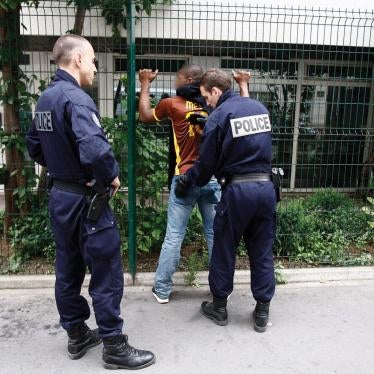An Afghan migrant is stabbed in the heart on the streets of Athens. Black-shirted paramilitaries linked to Hungary’s third-largest political party march through a Roma neighborhood shouting, “You will die here.” A neo-Nazi gang commits a string of murders of Turkish immigrants in Germany. An ideologue driven by hatred of “multiculturalism” kills 67 mostly young people on a Norwegian Island.
It may be comforting to see these incidents as isolated, disconnected or driven by local events. But the truth is more discomforting: hatred and intolerance are moving into the mainstream in Europe.
Intolerance in Europe manifests itself in support for extremist parties and violence and discrimination against minorities and migrants. Rather than tackling the problem head on, Europe’s leaders often downplay the problem or blame the victims. But concerted steps are needed to stop the violence and discrimination and curtail the corrosive influence of racist parties, without limiting freedoms of speech and association.
In many European countries, extremist parties— espousing racist, anti-immigrant or anti minority policies—are part of the political landscape. Their platforms vary, with some corresponding to traditional far-right parties. But they frequently define themselves by strong opposition to particular groups, including Muslims and immigrants (particularly among parties in Western Europe) and Roma (in Eastern Europe).
The neo-Nazi Golden Dawn party entered the Greek Parliament in June, securing 7 percent of the popular vote. In France, the National Front won almost 18 percent of the vote in the April 2012 first-round presidential elections. In the Netherlands, the Freedom Party caused the government to collapse in April 2012, withdrawing its support from ruling coalition (though it lost ground at the polls in September). Until recently, extremist parties were also part of government coalitions in Italy and Switzerland, and earlier in Austria. Similar parties have made significant gains in Denmark, Sweden, and Finland, and had electoral success in the 2009 European Parliament elections in Hungary, the UK, and elsewhere.
A 2011 study by Chatham House indicates that support for such parties is a long-term trend, in many cases pre-dating the economic downturn. A 2012 study by the European Network Against Racism notes that while some European countries have long had successful far-right parties, extremist parties have had increasing success in the last decade in countries where they traditionally had little support at the polls.
Intolerant political rhetoric is not confined to extremist parties. Too often, mainstream European politicians use intolerant or coded language about unpopular minorities. They justify such speech on the ground that the failure to discuss issues like immigration creates political space for extremist parties. But far from neutralizing extremist parties, this kind of rhetoric from government ministers and other mainstream politicians instead legitimizes their views, sending a message to voters that xenophobic, anti-Muslim, or anti-Roma sentiment is acceptable rather than a cause for shame.
Human Rights Watch staff witnessed a Greek MP from a mainstream party describe migrants as “cockroaches” during a Greek Parliamentary committee hearing in November on violence against migrants.
Silvio Berlusconi, then Italy’s prime minister, said in January 2010, that, “A reduction in [the number of] foreigners in Italy means fewer people to swell the ranks of criminals.”In 2010, the French interior minister at the time justified dismantling Roma settlements, asserting they were sources of “illicit trafficking, children exploited for begging, prostitution or delinquency,” while the Romanian foreign minister made public statements suggesting that Roma are genetically predisposed to criminality. The same yearChancellor Angela Merkel of Germany used a major speech to tell migrants in Germany: “We feel tied to Christian values. Those who don’t accept them don’t have a place here” (although in 2012 she softened her tone, saying that Muslims are part of Germany).
Just as mainstream politicians sometimes echo the intolerant views commonly associated with extremist parties, there is evidence to suggest that such views are shared far more widely than those who vote for extremist parties. In polling data from 2010 by the Friedrich Ebert Foundation, half of those polled across eight EU states -- including France, Germany and the UK -- shared the view that there are too many immigrants, and more than 40 percent concluded the same about Muslims.
Anti-Semitism and anti-Roma sentiment are also widespread. In Hungary, 68 percent of those polled in December 2012 said they would not allow their child to be friends with a Roma child. The numbers who would oppose a child’s friendship with African and Jewish children were slightly lower (58 and 46 percent respectively) but still deeply alarming, not least because it suggests anti-Roma, anti-migrant and anti-Semitic prejudice are widespread. German, Swedish and UK authorities all recorded large numbers of anti-Semitic incidents in 2010, the most recent data available.
What is driving this intolerance? Academic research suggests that fears about loss of culture, terrorism and crime and competition for economic resources all provide part of the explanation. And while economic factors may not be the principal driver, Europe’s economic and financial crisis and resulting austerity are unlikely to help. The consequences can be measured in broken bones and restricted opportunities.
In Italy, Human Rights Watch has documented unchecked racist and xenophobic attacks against African migrants, Roma and Italians of foreign descent, including mob violence. Our research documented mob violence against Roma camps in Naples and a three-day rampage against African seasonal migrant workers in Calabria. An Italian man of Burkina Faso origin was bludgeoned to death on the street in Milan in 2009 after a petty theft from a café. In 2010, an Indian man was beaten in a town outside Rome, doused with gasoline, and set on fire. At the end of 2011, a man opened fire on African street vendors in Florence, killing two and wounding three others.
In Greece, Human Rights Watch research found that the failure of the authorities to respond adequately to vigilante attacks on migrants is fraying the fabric of society. Human Rights Watch documented more than 50 serious attacks, including two on pregnant women. A Somali asylum-seeker who acted as a translator for Human Rights Watch was beaten by five men in Athens in June, breaking his hand. He was attacked again in January, by six people who beat and kicked him, injuring his nose and back.
According to a recent EU Fundamental Rights Agency study, as many as one in four Roma (in the Czech Republic, Greece and Poland), Somalis (in Finland and Denmark), and Africans (in Malta and Ireland), said they had experienced hate-motivated violence or serious harassment in the previous 12 months.
Yet national authorities frequently refuse even to acknowledge that hate crimes are a problem. When Human Rights Watch issued our report on xenophobic violence in Italy, an Italian official insisted to us during a meeting that, “Italians are not racist by nature.” Similarly, our report on hate crimes against migrants in Greece met with the response that, “Greece has a history of hospitality.”
Governments often point to the low number of hate crime recorded in their official statistics. The OSCE Office of Democratic Institutions and Human Rights annual reports on hate crimes show few hate crimes recorded by police or prosecuted in the courts in many countries, including EU members. But what governments fail to mention is the frequent failure to collect such data, the common misclassification of racist attacks as ordinary crimes, and the reluctance of victims to come forward.
The tendency to play down the problem is similar when it comes to far-right groups. In a recent Europol survey of 30 European police forces, 29 forces said the threat of far-right violence was low (Germany was the exception). Police in 5 EU states, including Greece, reported that there were no active far-right groups in their country.
Hate violence is only the tip of the iceberg, of course. For many minorities and migrants, discrimination in housing, education and employment is a fact of life.
Research demonstrates that Muslims and Roma experience persistent hostility and discrimination across the region. African and other migrants, as well as European citizens of migrant descent, also face significant discrimination -- including by the police. This is reflected in the comprehensive data collected by the EU Fundamental Rights Agency in 2009, in many judgments by the European Court of Human Rights and EU Court of Justice, and in copious reports by non-governmental organizations across Europe.
The situation for Roma, Europe’s largest ethnic minority, is particularly alarming. The EU recognizes that the persistent discrimination and marginalization require intervention, and has developed a strategy and funding to that end. But in practice Roma are frequent scapegoats -- blamed for crime and social problems.
Roma migrants from Eastern Europe face forced eviction and expulsion in France and Italy. Further east, in Hungary, Romania, Bulgaria, the Czech Republic, and Slovakia, the situation is even more alarming, with little progress toward ending forced evictions and housing and school segregation (also a problem in Greece) despite hundreds of millions of euros in EU funding and binding rulings by the European Court of Human Rights.
These violations of basic human rights betray the values that Europe seeks to represent. They also cause an enormous waste of human potential, with millions of people who have much to contribute to Europe’s prosperity denied access to the education and employment that they need to fulfil their potential.
Reducing intolerance and its symptoms is going to require a multi-faceted response at the EU, national and local levels.
The first thing leaders at all levels need to do is to acknowledge that Europe is no longer so friendly and welcoming and that it is damaging both its image and its social fabric by denying the problem. Tackling hate violence should be a top priority. Each government needs to pass robust and effective laws that require recognizing hate crimes and gathering data and evidence to prosecute them effectively. Then leaders and lawmakers need to provide police officers, prosecutors and the courts with the tools, training, and political support to bring people who commit hate crimes to justice.
Officials also need to make sure that undocumented migrants, who are often vulnerable to such violence, can seek help from the authorities without fear of arrest and deportation. Human Rights Watch research in Greece found that fear of arrest was a key impediment to reporting attacks, and that some police officers had threatened victims with deportation if they pursued their complaint.
European countries also need to put in place general measures to combat discrimination against minorities and migrants, including making sure that their policies do not discriminate in law and practice. They need to enforce anti-discrimination legislation through properly funded anti-discrimination bodies and the courts, and to comply fully and speedily with discrimination-related rulings of domestic and European courts. And though it is controversial in some parts of Europe, governments need to collect statistics disaggregated by race, ethnicity and religion to help understand the scale of the problem and allow targeted policy responses.
It is vital to address hate speech too. If Europe is serious about curbing intolerance and draining support for extremist parties, political leaders need to stop using intolerant and coded language, and forcefully condemn others who express such views.
There were inspiring ideas on combatting hate speech in Europe at a November 2012 conference in Budapest, including education, counter-speech, media self-regulation and moderating online speech. The Council of Europe will begin a major campaign in March aimed at young people against online hate speech.
Hate speech that actually incites violence should be combated though the criminal justice system. But over-use of the criminal justice system carries considerable risks for freedom of expression. Europe needs to set a positive example for the rest of the world, not advocate models that are liable to misuse, criminalizing language that offends the state or the powerful.
There is a particular risk of overreaction when it comes to speech on the internet and social media. The UK provides a salient example. There have been a series of prosecutions in the UK for offensive, including racist, comments posted on the internet. In October, a 19-year old man was sentenced to 12 weeks in a young offenders’ institution after posting comments, some sexual, about two girls who are missing and presumed dead. The same month a 20-year old man was sentenced to 240 hours of community service for posting comments about dead soldiers on his Facebook page.
Jailing people for speech often violates rights, especially in cases where there is no evidence of incitement, and occupies police and judicial resources that would be better directed toward those who commit or incite violence. It also sends the wrong message to other countries’ leaders who may be looking to censor internet speech, and contradicts the UK government’s position that it is a champion of free expression on the internet.
The need to protect religious freedom is also sometimes invoked in Europe to justify restrictions on speech. Greece has several ongoing criminal investigations under the country’s 1951 blasphemy law, including against a theater production in Athens that was disrupted by extremists who objected to its portrayal of Jesus as gay. In Poland, the Supreme Court gave the green light last October for to prosecute a heavy metal singer charged with insulting religion after he tore up a Bible on stage.
It is important to protect the rights of members of religious minorities in Europe, including the freedom to manifest their religion in public and private. But blasphemy laws protecting religions themselves, or criminalizing mere offense, violate free expression. That is why the Rabat Plan of Action on the Prohibition of Incitement (a UN led process to clarify the proper scope of prohibition of incitement under international human rights law) calls for the repeal of such laws. The Dutch government announced in November that it will repeal its blasphemy law. Other European countries that still have blasphemy laws on the books should follow suit.
Despite the negative influence of extremist political parties, particularly those whose members are linked to violence, European governments should resist the temptation to ban them. The governments of all 16 states in Germany have agreed to back a proposal to ban the National Democratic Party (NPD). And the Council of Europe’s European Commission against Racism and Intolerance (ECRI) recently suggested that Greece should consider banning the Golden Dawn party. But this approach carries considerable risks, and raises questions about the right to political participation and freedom of assembly.
Clearly, if the leadership or other members of a political party are involved in criminal conduct they should be prosecuted, including by withdrawing parliamentary immunity where appropriate. There is also some scope to consider sanctions or restrictions on political parties thatengage in unconstitutional speech or activities. And mainstream politicians should unambiguously condemn expressions of hatred, hostility and division by extremist parties.
But banning extremist parties is unlikely to change the minds of their supporters. Instead it drives the parties underground and risks denying those drawn to support them an opportunity to participate in the political system. An effort to ban an extremist party that fails may end up strengthening it -- a concern among those in Germany who oppose the effort to ban the NPD. And while some extremist parties in Europe are already linked to violence, exclusion from democratic politics can increase the attractiveness of violence as a political tool, since leaders can point to an alleged absence of peaceful alternatives.
Mainstream parties should be working to draw away political support from these parties, without aping their policies or embracing their rhetoric. A new study from Counterpoint, a research institute, “Recapturing the Reluctant Radical,” offers a series of suggestions. They include addressing the particular concerns of older and women voters who are increasingly voting for extremist parties, responding to local factors that drive support for extremist parties, investing in education and services to counter extremism, and being willing to have difficult conversations about immigration and integration in ways that promote tolerance.
European Union institutions also have a vital role to play. The EU has good laws for the most part, including rules on prohibiting discrimination and combating racism and xenophobia through the criminal justice system. But it needs to be willing to hold member states to account if they don’t combat intolerance and its ugly symptoms. The monitoring and reporting efforts of the EU Fundamental Rights Agency remain important. The jurisprudence of the EU Court of Justice is also vital, notably on anti-discrimination.
The European Commission, European Parliament, and Council of the EU need to strengthen their words, actions and monitoring to curb intolerance. The Commission is due to take stock this year of whether member states have lived up to EU rules on combating racism through the courts. That is a good opportunity to look more widely at whether countries are doing enough to address hate crimes.
The Commission should heed the recommendation of the European Parliament’s December annual report on fundamental rights in the EU to use legal infringement proceedings and to create an early warning and prevention mechanism for human rights abuses inside its own borders. The Commission should also expand the scope of its planned annual report on the justice systems of member states to encompass fundamental rights.
The European Parliament and Council both need to be willing to break the code of silence that makes them reluctant to name individual member states engaged in abusive practices. And the Council should make better use of its working party on fundamental rights inside the EU (known as FREMP) to examine substantive human rights concerns in member states, including racist and xenophobic violence.
Martin Niemoller’s famous statement about Nazi Germany “First they came for the communists, but I did not speak out because I was not a communist…” concludes “then they came for me and there was no one left to speak for me.” While Europe today is vastly different than it was in the 1930s, the statement reminds us why standing up against intolerance is so important. Left unchecked, intolerance and hatred will corrode Europe’s values and eat away at our societies. Responding, and doing so in ways that uphold rights, is urgent.
Benjamin Ward is deputy director in the Europe and Central Asia Division of Human Rights Watch









